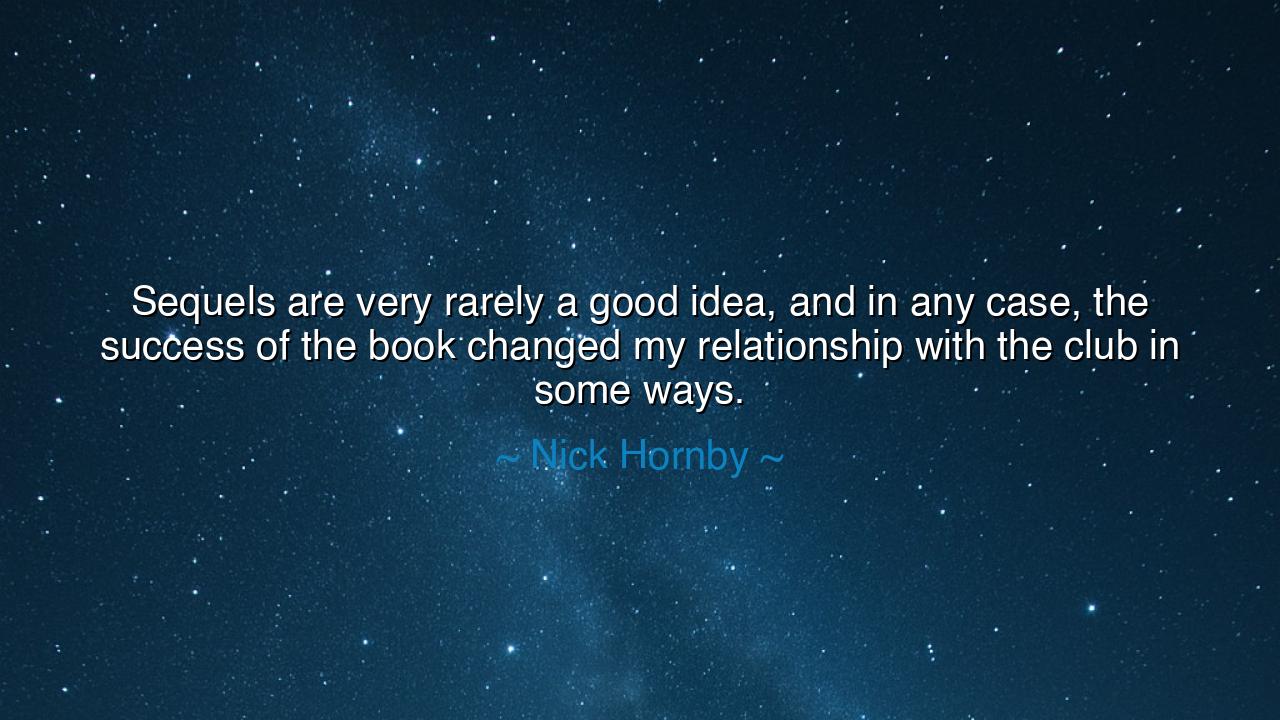
Sequels are very rarely a good idea, and in any case, the
Sequels are very rarely a good idea, and in any case, the success of the book changed my relationship with the club in some ways.






The words of Nick Hornby, “Sequels are very rarely a good idea, and in any case, the success of the book changed my relationship with the club in some ways,” speak with the candor of an artist mindful of truth. He reminds us that repetition for its own sake seldom carries the same spirit as the first creation. A sequel may mimic form, but the fire that gave birth to the original is difficult to summon twice with equal strength.
At the heart of this reflection lies the nature of success. When a book or work of art finds its mark, it alters the path of both creator and audience. What was once personal becomes public, what was once simple becomes layered with expectation. Hornby points to the shift in his relationship with the club, showing how triumph can distance even as it elevates, reshaping bonds that once were natural into something more burdened by attention.
The origin of these words is rooted in Hornby’s own experience as a writer, particularly with his celebrated work Fever Pitch. Its success lifted him into prominence, but it also transformed the way he was seen by the football club that inspired him. The familiar joy of fandom was no longer private; it was bound up with recognition and the shadow of fame. Thus, his words carry the bittersweet truth that every achievement comes with change, both welcome and unsettling.
Let this wisdom endure: creation is a living flame, unique to its moment. To force it into repetition risks extinguishing what made it burn brightly. Likewise, we must accept that success reshapes our relationships—with people, with places, even with the passions that gave birth to our art. Hornby’s words remind us to approach both triumph and continuation with humility, lest we lose the purity of what first stirred our hearts.






TVThuy Vi
Hornby’s opinion about sequels being rarely good ideas makes me think about the pressure to follow up something successful. It can be hard to strike the right balance between staying true to the original and offering something new. What if a sequel was treated like a standalone story rather than a continuation? Also, the fact that his relationship with the club changed because of the book adds a layer of complexity. Did success bring him closer to the club or push him away?
TNTran Thanh Nhon
Nick Hornby seems to have a point about sequels rarely living up to expectations, but I wonder if that’s because they tend to rely on the same formula that made the first work successful. Could a sequel work if it took a completely different direction, one that didn’t feel like a direct continuation? I also find it interesting how success changes relationships—did the book elevate his status in the club, or did it create a kind of separation?
THDo Thi Huyen
It’s interesting that Hornby feels that sequels are rarely a good idea. In some ways, it makes sense—sequels often feel like they’re just trying to relive the past. But there’s also something about continuing a story that could offer new insights. I wonder if there’s a balance between keeping the spirit of the original work and introducing something fresh. I’m also curious about how the book altered his relationship with the club—did it add pressure or cause a shift in how he viewed the club?
THNguyen Thi Thu Huong
I agree with Hornby to some extent. Sequels often don’t live up to the original, but I think there are exceptions. Some sequels expand on the world in ways that feel necessary and natural, rather than just trying to cash in on success. What do you think makes a sequel stand out as worthwhile? I’m also curious about his relationship with the club. How does success, especially related to something personal like a book, change how you view your own place within a community?
LPLuyen Pham
Hornby’s comment about sequels makes me reflect on the challenge of following up a successful work. It's often hard to replicate the initial success without feeling repetitive or forced. But can there be value in a sequel that explores new territory, even if it’s not as commercially successful? Also, his relationship with the club changing due to the book is something I find fascinating—how much does fame or success impact one’s personal connections?